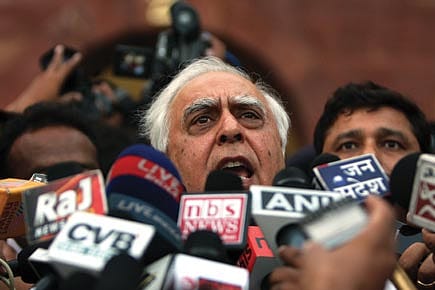Over to Oversyllabic Sibal

Every time Sibal speaks on the 2G scam, he contradicts either his Cabinet colleagues or the CBI, or the CAG…
Kapil Sibal, like a true lawyer, is a man of many words. Unfortunately, every time he opens his mouth on the 2G scam, the Telecom Minister contradicts either his Cabinet colleagues or the CBI, or the autonomous auditor, CAG. The latest in this series is his defence of P Chidambaram. On 25 July, A Raja, the former Telecom Minister, told the CBI court that he cannot be charged with allocating 2G spectrum cheaply to telecom firms in January 2008.
This accusation, levelled against Raja, was based on the high valuations that new licencees like Swan and Unitech attracted when they subsequently sold stakes to foreign firms. The CBI assumed that these valuations, several times higher than what these firms had paid for their spectrum, were based on market perceptions of what the licences were worth. In its first chargesheet, the CBI stated that the estimated loss to the Government, going by the Swan and Unitech deals, 'comes to Rs 7,105 crore. On a pro rata basis, the estimated loss for all the 122 UAS licences issued in 2008 is more than Rs 22,000 crore'. But Raja maintained that Chidambaram, the former Finance Minister, told him in front of the Prime Minister that a sale of equity did not amount to a sale of the licence; if so, the CBI could not conclude that there was a loss to the exchequer.
The same day, Sibal said that what Swan and Unitech had undertaken was not a sale but dilution of equity, done by issuing fresh shares to foreign firms; thus, the deals' figures could not be equated with under-pricing of spectrum, a stance contrary to that of the CBI and CAG.
In the past, Sibal had said that auctions may not be the best way to sell spectrum, as firms could overpay and pass on the burden to consumers. If one accepts this, then the Centre's decision to auction 3G spectrum in 2010 (and 4G in the future) is blatantly wrong. And so was the telecom regulator's February 2011 recommendation that 2G spectrum be sold at six times the price at which Raja assigned it.
AIming High
20 Feb 2026 - Vol 04 | Issue 59
India joins the Artificial Intelligence revolution with gusto
Sibal has also said that the 2G scam was the result of rivalries among various telecom firms; this statement implies lobbying to influence policies in their favour. So, if the Cabinet were to decide that 2G spectrum henceforth be charged at a lower rate than what was suggested by the telecom regulator, are we to assume that corporate pressures have prevailed—yet again?
